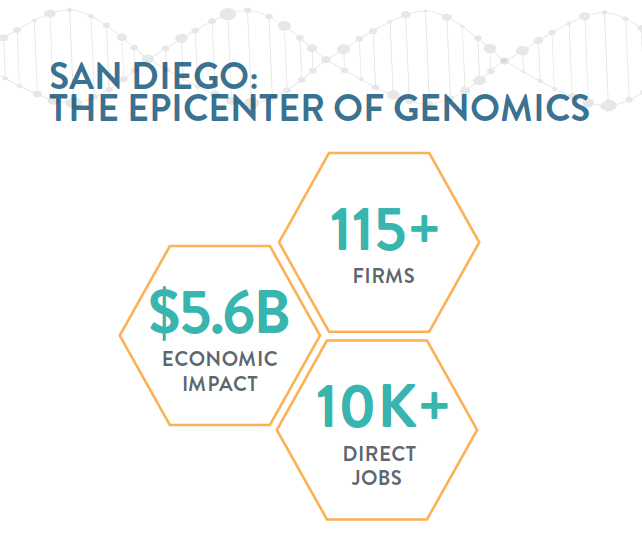EDC study quantifies impact of artificial intelligence, machine learning
San Diego industries that are embracing artificial intelligence (AI) support an estimated 175,680 jobs and $33.3 billion in annual gross regional product, according to a study released today by San Diego Regional EDC. Underwritten by Booz Allen Hamilton, “Measuring the Future: AI and San Diego’s Economy” is the first in a series of reports that will identify key industries and clusters where AI and machine learning (ML) have been implemented, and ultimately quantify the impacts of these technologies on San Diego’s regional economy.
The study—available at SanDiegoAI.org—includes a historic timeline, cluster map, and cross-references AI patent language with job postings to anticipate the future impacts of AI and ML on the job market.
AI and ML technologies have swiftly infiltrated most every facet of our lives as computing power and speed increase. Self-driving cars, algorithmic trading, customer experience bots and AI assistants like Siri and Alexa have become commonplace tools used by people at home and at work.
“The proliferation of AI and ML technologies promises to be a transformative force for businesses worldwide—and like in many innovative industries—San Diego is at the forefront. With this report, the EDC Research Bureau helps paint a picture of the impact of AI, proving its potential to grow jobs and even help narrow gender and racial wage gaps,” said Mark Cafferty, president and CEO, San Diego Regional EDC.
Contrary to popular belief and despite current economic conditions, three in five AI developers (62 percent) expect to see the number of employees specifically engaged in AI-related work grow over the next 12 months. This means locally based AI talent could help meet growing demand across the U.S. as employers try to hire workers in earnest that possess skills readily available from San Diego AI. Notably, job postings data in Sun Belt metros like San Antonio, Austin, Dallas, Tampa and Miami show that employers are struggling to fill positions requiring facial and speech recognition skills—key specializations of AI developers in San Diego. Meanwhile, predictive and forecasting AI could help alleviate hiring difficulties among firms in major economic and financial centers, including New York, Philadelphia, and Chicago. More than eight in 10 AI developers in San Diego specialize in machine or deep learning technologies, a fundamental building block for predictive AI.
Large local companies in San Diego like Booz Allen Hamilton, Northrop Grumman Corporation, ResMed and growing startups and small businesses like Lytx, Lockton, Traits AI and Semantic AI are helping to lead the charge in AI—enabling people and firms to operate more quickly and efficiently. Specifically, the use of AI or ML technologies largely supports four areas of firm activity: the development of new products and services, improved efficiency and productivity, reduced costs and an increase in business revenues.
“Booz Allen Hamilton is at the forefront of AI adoption, development and implementation, and we believe that San Diego’s companies can leverage this technology to meet their missions, attract talent and fuel economic activity,” said Joe Rohner, a Booz Allen director and leader in the firm’s analytics practice and AI services business. “We are energized that EDC’s report findings show local respondents see AI as truly helping the San Diego economy by creating more jobs—not eliminating them. People are essential to the ethical application of AI, and this technology will enable organizations and their workforce to increase productivity, quality and efficiency—in San Diego and globally.”
Despite AI’s productivity-boosting, job-creating power, a number of challenges remain. Top of mind for most local employers is the inability to source qualified talent. However, COVID-19 and the subsequent increase in remote work has expanded the talent pool for San Diego County’s AI and ML employers.
“Rapidly developing machine learning/artificial intelligence technology that enhances the work our men and women in uniform do every day is critical to the future of defense. Northrop Grumman is well positioned to continue to grow the local talent pipeline through our San Diego-based education programs so businesses in our community have the right skill sets available to support this important and rapidly evolving field,” said Alfredo Ramirez, Vice President of Northrop Grumman’s San Diego Autonomous Design Center of Excellence.
OTHER KEY FINDINGS
- Average salary in AI/ML-concentrated industries is $127,960—3.9 percent above the national average for these industries and more than 70 percent above San Diego’s average worker salary.
- For every 1,000 jobs gained in this cluster, another 1,400 jobs are created in other industries.
- Survey proves AI adoption is creating job opportunities in the region:
- 66 percent of firms agreed that the use of AI and ML has created new job opportunities
- 54 percent of firms agree that AI and ML are increasing the need for more workers at their business
- 31 percent of jobs in AI-concentrated fields require only a high school diploma and pay an average of $22.42 per hour
- The boost to productivity and efficiency from AI and ML should lift wages in traditional or population-serving industries, which employ a larger share of women and non-white workers than other sectors, and could therefore potentially reduce gender and racial wage gaps as these technologies are adopted.
The report was produced by San Diego Regional EDC, underwritten by Booz Allen Hamilton, and sponsored by Northrop Grumman Corporation, ResMed, Lytx and Lockton.
Read the full study at SanDiegoAI.org
For more research from EDC, click here.

